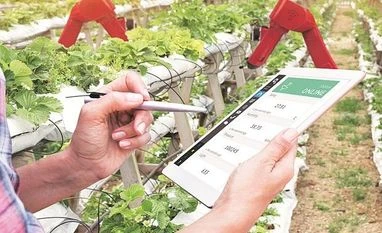Reliance Industries (RIL) is foraying into the growing agritech business through a combination of online technology, leveraging the strength of its new partner Facebook and collaborations in farm equipment innovations as part of its move to expand its “farm to fork” model.
For its own retail supply for Reliance Fresh and other stores and also for the soon-to-be-launched e-commerce play through JioMart, the focus is on ensuring a 12-hour delivery schedule between the harvest to the store by sourcing nearly 50 per cent of all vegetables required by consumers shopping in modern retail.
Facebook has picked up a 9.9 per cent stake in Jio Platforms and has also signed an agreement of collaboration with Reliance Retail.
According to discussions with analysts, the company has recently launched the JioKrishi app in the beta stage which aims to help farmers undertake precision farming.
The app will use data analytics to offer information on the right time for farmers to sow, irrigate, and fertilize to increase their productivity. It will also send alerts to farmers updating them on the weather, seasonal pests, crop loss trends, or rare attacks such as those from locusts.
With Facebook, the company is also looking at focusing its attention on the needs of over 120 million farmers, apart from small and medium enterprises (SMEs). Among the various areas of cooperation under discussion are how to leverage WhatsApp with its over 400 million active users to provide personalised information to farmers as well as connect them to other agritech startups across the country.
This could also be connected with JioMart which would be incorporated within WhatsApp to understand consumer demand behaviour.
The advantage of doing so is evident from the fact that WhatsApp is already a popular mode of sharing information among farmers. The tie-up could also be used for farmers as a platform to make payments. Facebook is waiting for regulatory approval to offer WhatsApp Pay.
A Reliance spokesperson declined to comment on these plans.
Reliance had also collaborated earlier with Escorts, Microsoft, and Bosch to develop a small autonomous tractor as part of its plans to develop precision farming. The model, which has already been developed, can be used for seeding and tilling and also use in conjunction with sprayers.
Reliance has already brought 65,000 hectares of land under improved cultivation and trained over 38,500 farmers on agri-allied skills.
It has also put together an ambitious system to ensure 12-hour delivery from harvest-to-shelf by sourcing products ranging from carrots, tomatoes, leafy vegetables, and cucumbers, to mention only a few, which fulfil 50 per cent of the fruits and vegetables bought by the modern Indian retail consumer.
The company also sources 77 per cent of its fruits directly from farmers.
The company’s agritech business has been attracting a bevy of investors.
For instance, Ninjacart, the biggest player in the country, has Walmart and Tiger Global as one of the investors. It provides a business-to-business fresh produce supply chain connecting farmers, brands and retailers.
Zomato has also launched Hyperpure which will provide supplies such as fruit, vegetables, and meats to restaurants after sourcing from farmers and producers.
According to BofA research, while the market for fruits and vegetables is $150 billion, 97 per cent of these items are sold through 12 million kirana shops — a reflection of the fragmentation of the market by farmers who own less than an acre of land each.
This in turn has led to the rise of the middleman who keeps 60 per cent of the value of the product.
However, BofA says there are clear signs of consolidation which will leave only a few players such as Reliance, Amazon, Walmart, and Ninjacart.
Unlock 30+ premium stories daily hand-picked by our editors, across devices on browser and app.
Pick your 5 favourite companies, get a daily email with all news updates on them.
Full access to our intuitive epaper - clip, save, share articles from any device; newspaper archives from 2006.
Preferential invites to Business Standard events.
Curated newsletters on markets, personal finance, policy & politics, start-ups, technology, and more.
)